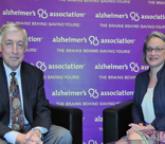Video

Lawrence Friedhoff, MD, PhD, and Ilise Lombardo, MD
At the 2015 Alzheimer's Association International Conference, Drs. Friedhoff and Lombardo discuss results from the completer analysis of RVT-101...

WASHINGTON, DC—RVT-101, an oral 5-HT6 receptor antagonist, provided statistically significant improvements in cognition and function to patients with mild-to-moderate Alzheimer’s disease who were receiving donepezil, compared with patients receiving donepezil alone, according to a completer analysis presented at the 2015 Alzheimer’s Association International Conference. In addition, patients tolerated the drug well. Those who received 35 mg of RVT-101 once daily had higher trial-completion rates and fewer falls than those who received placebo, said Lawrence Friedhoff, MD, PhD, Chief Development Officer of Axovant Sciences.
The results of the completer analysis were similar to those of the primary intent-to-treat analysis, which also found that the 35-mg dose of RVT-101 provided statistically significant improvements on measures of function and cognition. “The results are very similar for these two analyses, which establishes the statistical robustness of the clinical trial data,” Dr. Friedhoff said.
Mechanism of Action
5-HT6 receptors are localized almost exclusively in the CNS, and 5-HT6 receptor antagonists increase the release of acetylcholine, thus raising acetylcholine concentrations in the synapses, said Dr. Friedhoff. “We expect this [mechanism] to be an effective way of treating Alzheimer’s disease because we know that cholinesterase inhibitors also increase acetylcholine in the synapse, only they do it indirectly by inhibiting the enzyme that breaks down the acetylcholine,” he said. “Given that mechanism of action, it makes sense that 5-HT6 receptor antagonists would work best on top of a background of cholinesterase inhibitor therapy because it doesn’t do much good to release extra acetylcholine if it’s just going to be degraded by the enzyme.”
A 48-Week Trial
The completer analysis was based on the results of a phase IIb trial that randomized 684 patients with mild-to-moderate Alzheimer’s disease on a background of stable donepezil therapy. The trial included a single-blind placebo run-in period. Investigators then randomized patients to placebo or to 15- or 35-mg doses of RVT-101 administered once daily. Patients were between ages 50 and 85 with a clinical diagnosis of probable Alzheimer’s disease. They had Mini Mental State Exam scores of 10 to 26 at baseline and had received donepezil therapy for at least six months with stable dosing of 5 to 10 mg per day for at least the previous two months. The treatment groups were well balanced. Researchers extended the initial 24-week trial to a 48-week double-blind study based on the completion of additional preclinical safety studies. Primary end points included the Alzheimer’s Disease Assessment Scale–cognitive subscale (ADAS–cog) and the Clinical Dementia Rating–Sum of Boxes (CDR–SB), both at 24 weeks. Secondary end points included the Alzheimer’s Disease Cooperative Study–Activities of Daily Living (ADCS–ADL) scale.
Researchers observed statistically significant benefits on ADAS-cog and ADCS–ADL through 48 weeks in the completer analysis. On ADAS-cog and ADCS-ADL, patients who received 35 mg of RVT-101 achieved a 1.29- and 1.72-point benefit at week 12, respectively; a 1.63- and 2.11-point benefit at week 24, respectively; and a 1.82- and 2.34-point benefit at week 48, respectively, all compared with donepezil alone. Patients who received 35 mg of RVT-101 achieved a statistically significant benefit on CDR-SB, compared with subjects who received donepezil alone, at 12 weeks but not at other time points in the study. Scores for the 15-mg group were generally numerically superior to those of the placebo group on cognition and function, but the differences were not statistically significant. “Depending on the analysis that you do, you’re giving someone between six and nine months of additional time at a given level of function,” Dr. Friedhoff said.
High Study-Completion Rates
For the first 24 weeks, 89% of patients in the 35-mg group completed the study, compared with 88% of patients in the placebo group. For the second 24-week period, 89% of patients in the 35-mg group completed the study, compared with 87% of patients in the placebo group. “The completion rates were quite high for this kind of study,” Dr. Friedhoff said.
No drug-related serious adverse events were observed in any of the RVT-101 treatment groups. Falls occurred in 2% of patients in each of the RVT-101 groups, compared with 6% of patients in the placebo group.
Further Uses?
Researchers have evaluated RVT-101—known as SB742457 before Axovant acquired the drug from GlaxoSmithKline—in more than 1,250 patients and healthy volunteers across 13 clinical trials. Investigators plan to start a confirmatory phase III trial in the fourth quarter of 2015, Dr. Friedhoff said. The phase III trial will test a 35-mg dose of RVT-101 versus placebo in patients on a background of donepezil therapy. ADAS-cog and ADCS-ADL will be the primary end points, he said.

At the 2015 Alzheimer's Association International Conference, Drs. Friedhoff and Lombardo discuss results from the completer analysis of RVT-101...

Dr. Kirshner reviews emerging treatments for Alzheimer's disease at the Vanderbilt Symposium.
